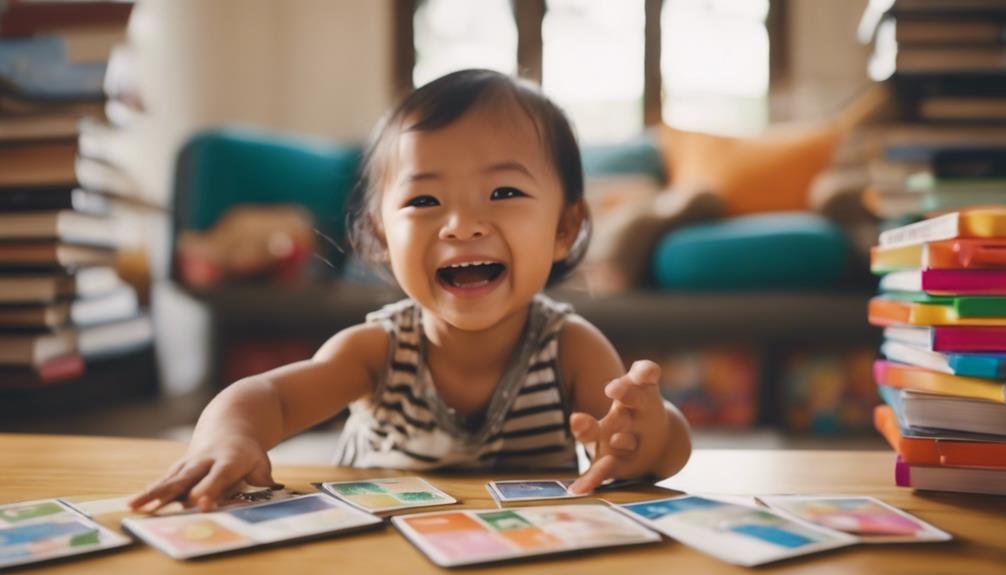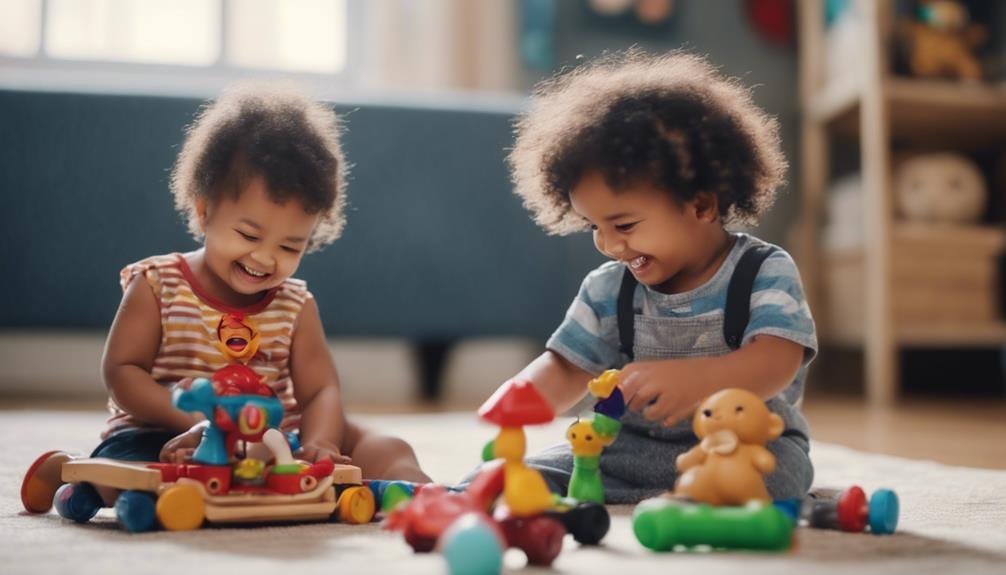"Cherishing Little Steps - A Haven for Baby and Family Journeys"
The Benefits of Bilingualism: Introducing a Second Language to Your Toddler
Introducing a second language to your toddler can open doors to a world of advantages that extend far beyond just linguistic skills. The benefits of bilingualism go beyond mere language proficiency and encompass various aspects of cognitive and social development. As you embark on this journey with your little one, consider how this early exposure can shape their future in ways you may not have anticipated. The impact of bilingualism on your toddler's growth is profound and far-reaching, paving the way for a plethora of opportunities that await them.
Key Takeaways
- Bilingual toddlers exhibit enhanced problem-solving skills and increased creativity.
- Exposure to multiple languages enhances social communication and interpersonal abilities.
- Bilingualism nurtures cultural awareness, empathy, and understanding of diverse traditions.
- Introducing a second language to toddlers leads to long-term cognitive benefits and academic success.
- Bilingualism strengthens neural pathways, cognitive flexibility, and memory retention in toddlers.
Cognitive Development and Language Skills

Bilingualism in toddlers has been shown to positively impact cognitive development and language skills. When children are exposed to two languages from an early age, their brains are constantly engaged in distinguishing between the two, leading to enhanced cognitive abilities. Research indicates that bilingual toddlers often exhibit better problem-solving skills, increased creativity, and improved multitasking abilities compared to monolingual children. This heightened cognitive development is attributed to the need to constantly switch between languages, which exercises the brain and strengthens neural pathways associated with cognitive functions.
Moreover, bilingualism has a significant impact on language skills in toddlers. Children exposed to multiple languages tend to have a more extensive vocabulary, better grammar skills, and enhanced communication abilities. This linguistic advantage not only applies to the languages they're learning but also extends to their overall language development. Bilingual toddlers have been found to outperform their monolingual peers in tasks that require understanding different linguistic structures and rules. The exposure to diverse language systems from an early age provides a solid foundation for strong language skills in the future.
Enhanced Problem-Solving Abilities
By engaging in the constant practice of distinguishing between two languages, toddlers exposed to bilingualism develop enhanced problem-solving abilities. This cognitive advantage stems from the mental flexibility required to navigate between two linguistic systems seamlessly. Here's how bilingualism can sharpen your little one's problem-solving skills:
- Enhanced Cognitive Control: Bilingual toddlers exhibit better cognitive control, allowing them to focus, ignore distractions, and switch between tasks efficiently.
- Improved Critical Thinking: Juggling multiple languages encourages toddlers to think critically, analyze information from different perspectives, and make informed decisions.
- Enhanced Creativity: Bilingualism fosters creativity by stimulating the brain to find innovative solutions to linguistic challenges, which can transfer to problem-solving in various contexts.
Through bilingualism, your toddler can hone their problem-solving abilities, setting a strong foundation for future academic and professional success.
Improved Social Communication

Engaging in bilingualism from a young age can significantly enhance a toddler's social communication skills. Research indicates that children exposed to multiple languages tend to develop better interpersonal abilities, such as empathy, perspective-taking, and conflict resolution. By navigating different linguistic and cultural contexts, bilingual toddlers learn to adapt their communication style to fit various social situations, making them more flexible and effective communicators.
Here is a table summarizing the benefits of bilingualism on social communication skills:
| Benefits of Bilingualism for Social Communication |
|---|
| Enhanced empathy and perspective-taking skills |
| Improved conflict resolution abilities |
| Increased flexibility in communication styles |
| Better understanding of diverse cultural norms |
| Enhanced social integration and acceptance |
Increased Cultural Awareness
Developing cultural awareness through exposure to multiple languages at a young age broadens a toddler's understanding of diverse traditions and customs. This early exposure lays a foundation for appreciating different ways of life and enhances empathy towards people from various backgrounds.
Here are three key ways in which increased cultural awareness benefits toddlers:
- Promotes Acceptance: By learning different languages, toddlers gain insight into various cultures, fostering acceptance and respect for diversity from an early age.
- Enhances Communication Skills: Exposure to multiple languages helps toddlers understand that there are different ways to express thoughts and feelings, improving their ability to communicate effectively with individuals from various cultural backgrounds.
- Encourages Curiosity: Learning about different languages and cultures sparks toddlers' curiosity about the world around them, encouraging them to explore and appreciate the richness of global diversity.
Through these avenues, bilingualism not only enriches a toddler's linguistic abilities but also nurtures a deep sense of cultural awareness and appreciation.
Long-Term Benefits for Academic Success

The long-term benefits of bilingualism for academic success include improved cognitive abilities and higher proficiency in problem-solving skills. Research indicates that individuals who speak more than one language tend to have better executive function skills, such as focusing attention, switching between tasks, and problem-solving. These cognitive advantages can directly translate into academic success by enhancing learning abilities and academic performance. Bilingual individuals often exhibit stronger critical thinking and creativity, which are essential for excelling in various academic disciplines.
Moreover, bilingualism has been linked to increased neural plasticity, which refers to the brain's ability to adapt and reorganize itself. This heightened plasticity can lead to improved memory retention, faster information processing, and enhanced learning capacities. By engaging with multiple languages, toddlers can develop cognitive flexibility and a broader perspective, which are valuable assets for academic achievement in the long run.
Incorporating a second language into your toddler's learning journey can thus pave the way for enhanced academic success and cognitive development, providing them with a solid foundation for future educational endeavors.
Frequently Asked Questions
How Can I Maintain Consistency When Introducing a Second Language to My Toddler?
To maintain consistency when introducing a second language to your toddler, create a routine. Use daily activities like reading, singing, and playing in both languages. Encourage interaction with native speakers and keep it fun and engaging.
Are There Any Potential Challenges or Drawbacks to Raising a Bilingual Child?
Navigating the challenges of raising a bilingual child can be daunting, but the benefits far outweigh any drawbacks. Embrace the journey, stay patient, and celebrate the unique cognitive advantages and cultural richness your child will enjoy.
What Resources or Tools Can Assist Parents in Teaching a Second Language at Home?
To assist parents in teaching a second language at home, consider using bilingual books, online resources like language learning apps, language immersion programs, and engaging in cultural activities. These tools can enhance language acquisition and cultural understanding.
Is There an Optimal Age or Time to Start Introducing a Second Language to a Toddler?
You can start introducing a second language to your toddler as early as possible. The optimal age is before five years old when language acquisition is most natural. Consistent exposure and interactive learning are key for success.
How Can Parents Ensure That Both Languages Are Equally Reinforced and Practiced?
To ensure both languages are equally reinforced for your toddler, create a consistent routine. Incorporate daily activities using each language, like reading, singing, and storytelling. Encourage interactions with native speakers and provide a language-rich environment at home.
Conclusion
In conclusion, introducing a second language to your toddler not only enhances their cognitive development and problem-solving abilities but also improves their social communication skills and cultural awareness. These benefits pave the way for long-term academic success and overall growth.
Embrace bilingualism for your child's future success, as it opens doors to a world of opportunities and enriches their life in ways that go beyond just language skills. Start early and watch them thrive!


